ABSTRACT
Parents at a private school organized by followers of Rudolf Steiner were sent a questionnaire about their religious and philosophical beliefs. The responses indicate that the majority of parents may be sympathetic to popular “new age” beliefs which Steiner followers also hold, but that they have little knowledge of the specific cult belief system. The respondents express overwhelming opposition to some pseudo-scientific doctrines which are taught in the school. The ethical consequences of the situation are considered.
INTRODUCTION
I fell in love with the San Francisco Waldorf school while my son was in sixth and seventh grades there. I became gradually more disillusioned as I learned more about the theory behind it. I was very impressed by the dedication of the teachers and the integration of art into all subjects. Their unconventional techniques such as teaching subjects in blocks of two or three weeks at a time appeared innovative and exciting. Some glimpses of Steiner’s writings in books sold at the school raised difficult questions, but enamored as I was, I put my misgivings aside for a while. I accepted the teachers’ assurances that the school used Steiner’s method of education, but didn’t teach the content of “anthroposophy,” Steiner’s name for his occultist group which split off from Theosophy.
I felt obliged to react when my son brought home strange reports from science classes. For example, a specialist who came in to teach a sixth-grade chemistry unit declared “the elements are earth, air, fire and water.” I took a closer look at the science curriculum and found bad news. The class work included a significant amount of pseudoscientific material drawn from the teachings of Steiner and his followers. Students were being taught lunatic fringe beliefs that are completely unacceptable as science outside a cult of believers. For example, the assertion that white light can not be divided into the colors of the spectrum, and statements about “planetary influences” on the growth of plants. But there was worse to come. The whole science curriculum was dumbed-down to avoid conflict with anthroposophical doctrine. This meant teaching mainly observation of nature, without the essential theories that tie it all together and lead to useful application of the knowledge.
As a committed and active parent, I expressed my objections, and proposed a committee of parents and teachers to improve the science curriculum. The teachers responded by saying that parents choose the school because of its spiritual approach, and if we didn’t like it we should leave. This struck me as a bit odd, since the school’s recruitment process didn’t give a hint of there being an agreement on religious matters between the parents and the school. The parents I was acquainted with knew little about anthroposophy. When I persisted in my challenge, the governing committee of teachers expelled our family and hushed up the affair.
I decided that the best antidote for this apparently habitual hypocrisy would be to expose the facts. As a first step, I wanted to test the teachers’ claim that the parents shared the school’s philosophy. Maybe it was only me who was in the wrong place. Every group has a right to teach its beliefs. If the parents were all anthroposophists, then in their private religious school they could have as much anthroposophy as they liked.
I made up a survey which combined questions about belief systems in general with specific questions on characteristic tenets of Steiner doctrine. I sent the survey to 270 parents in 183 families. Two-parent families got one for each parent. I promised anonymity and included a stamped return envelopes. There was no follow-up, to minimize disturbance to the community.
Thirty-two surveys were returned, representing about twelve percent of the parent body. The quality of the responses was heartening. Answers to the “essay questions” were thoughtfully drawn, and many wrote unsolicited comments in the margins. These were so interesting that I reproduce them below, and regret not having encouraged parents to comment as they went along.
I received one phone call from a parent who viewed the survey as an attack on the school and refused to participate, saying that I could distort the results to prove anything that I wanted. Another wrote me to discuss her discomfort with the school’s philosophy.
RELIGIOUS BACKGROUNDS
The first section of the survey asked about the parent’s religious upbringing and their present beliefs.
“In what religious/philosophical tradition or traditions did your parents raise you?”
10 Catholic (including one “mostly non-religious”)
5 Jewish (including one “non-religious”)
5 None (including one “None/Agnostic”, one “Let your conscience be your guide, Golden Rule, etc.”)
3 Methodist (including one “Christian-Methodist”)
1 German Lutheran
1 Protestant (“weakly”)
1 “Unitarian;” secular humanism; artistic/intellectual
1 Unity Society of Practical Christianity
1 Marxism-Judaism-Aquinanism
1 Atheist, Protestant
1 Christian Science
1 Episcopalian
1 (no answer)
“If you now follow the teachings of a religious or philosophical tradition, please give its name or description:”
5 (no answer)
5 None
2 Jewish
20 others:
Treat others the way I treat myself
Self-Realization Fellowship (Yogananda)
I don’t really have strong religious or philosophical beliefs
Protestant
No one word to describe
Agnostic
I am an astrologer by profession and a metaphysicist
Zen Buddhism
Taoism-Judaism-Buddhism-
Humanistic-Spiritual Jewish-Taoist-Buddhist
Christian
Buddhist
Disciple of Paramahansa Yogananda, founder of Self Realization Fellowship (SRF);
I had a Somatic education within my studies of Psych.
No specific affiliation.
Every religion and spiritual teachings that have truth.
Buddhism (Vajryana and Theravadit)
Theravadin Buddhism/Judaism
Oh, a mixture of all the oldies.
NSA – Buddhism
31% were brought up as Catholics. The proportion of all types of Christian upbringings is 56%. Only 12% now affiliate with traditional denominations. I interpret twelve (37%) of the responses as Eastern or new-age positions, including seven (22%) who mention Buddhism. No one said they were affiliated with the Anthroposophical Society or the Christian Community, a church following Steiner.
PHILOSOPHICAL OR RELIGIOUS WORLD-VIEWS
“If the above isn’t sufficient, can you describe your world-view in a few words?”
We believe spirit created God. God created three realms. Causal, realm of thought, and created beings with causal bodies. God’s creation then manifest as the astral realm, the world of light. The causal beings were encased in astral bodies. Then, later, the physical realm, and we are encased in physical bodies every 300-500 years, *There is one purpose to life, i.e. life here on earth, to become one with god again.*
- “Secular Humanist” comes closest.
- I take one day at a time, but look forward to a technologically bright future. I enjoy and use the present technological advances of today. I look forward to virtual reality and know that it is not too far away. I am a scientific person!
- My true beliefs are that we reap what we plant.
- My view of the world at present is that it is headed for a major shift in the coming decade. We are literally moving from one dimension (or state of consciousness) into another, from 3rd to 4th, which will be represented by a total shift in human beings. We are in a state of much darkness (as we have been for eons) and the time is ‘now’ to shift this into the light. People must now make a conscious choice towards the light – else we are headed for MUCH upheaval! No thing is more important at this time (aside from letting go of all denials, which is another topic all together!).
- I have the simple belief in what goes around comes around. Hence, belief in the Golden Rule.
- Humanistic/Existential. Please note that the word God is left to my own definition, which may/may not be yours.
- Believe in a spiritual reality: unity of man, natural and spiritual world.
- Live and let live, do listen to the law of nature and its forces.
- I believe in an unknowable God – and the possibility of human spiritual evolution. I have had personal experiences of telepathy, past-life recall, and Awe, which lead me to believe there’s more out there than is quantifiable scientifically. My experiences of wonder and reverence are, in general, what make my life worth living.
- No, not to you here. Many of the questions below indicate your expectation to be “either-or” oriented. This does indicate your own personal lack of seeing the interrelatedness of all things, and energy, and your approach will prove unsatisfactory therefore.
- I just try to live a decent life, without harming anyone. Kind of a loner. I followed Eastern beliefs put forth by the TM movement at one time, but have snapped out of it. Independent thinking and individual freedom is important to me. People often “follow” because they are afraid to go it alone.
- I very much believe in the spirituality of the Body.
- Universal spiritual connectedness without affiliation to a one sighted dogma as with fundamentalism.
- God is Love and Love must Love.
- We are all “it” … God, if you will. Yet memory doesn’t serve many of us. Waking up to this realization is the ultimate.
- Although I am connected with the NSA organization, I am not a fanatic.
Several of these world-view statements indicate some kinship to the anthroposophical philosophy, but none of them use Steiner’s characteristic terminology.
STATEMENTS OF BELIEF
In the next section, parents were asked to rate their support for a variety of philosophical assertions. No comments were solicited but those that were made are reported.
“For each statement, please circle the expression which is closest to your own belief.”
True! ... Positively true True? ... Probably true ?? ... I don't know False? ... Probably False False! ... Positively False
1. “God created the earth in six 24-hour days about six thousand years ago.”
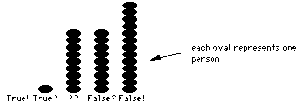
Respondents’ Comments
- Meaningless numbers.
Author’s Comments
Belief statement 1 expresses biblical literalism as held by evangelical Christians. Biblical literalists have their own school system, and evidently are not represented in this group. Question 2 (below) shows that a majority could be considered religious in the traditional sense.
2. “Even today, miracles are performed by the power of God.”
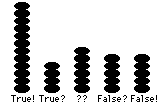
- Of course!
- Define God. I say he/she is within us all.
- (one changed it to “by unseen power.” )
3. “After death, human souls can return to live another life.”

- Of course!
- Yes, but I don’t believe in chronological time. All lives are lived at once.
4. “The spirits of the dead can speak through channelers.”

- A dangerous and absurd practice!
- What is dead?
5. “An astrological birth chart is useful because it contains information about a person’s character.”
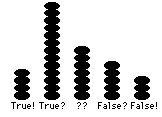
- It’s a very limited tool.
- Poor wording: “character.”
6. “Wearing a crystal can be beneficial to health.”
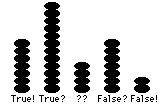
- Mildly, but definitely. Meditation is 100’s of times more effective.
- I suppose whatever one wants to believe.
Reincarnation (3) is a central doctrine of anthroposophy. The support for the statement on crystal power (6) is remarkable. It elicited a curiously small proportion of undecided.
7. Medicine has improved in the 20th century because theories and treatments are now subjected to scientific testing.
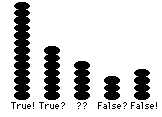
8. Anthroposophical medicine is superior to conventional medicine.
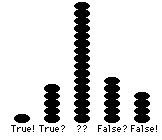
- Wot th’ heck IS it?
- Don’t know a thing about anthroposophy.
- Depends on circumstance.
- Anthroposophical medicine IS conventional (age-old) medicine and it is equal in quality to modern scientific medicine, meaning they complement each other.
Anthroposophical medicine is a major activity of Steiner followers. It explicitly opposes conventional scientific medicine. In 7 twenty parents supported scientific medicine and seven opposed it. In 8, half hadn’t heard of anthroposophical medicine. Of the half who had an opinion, a majority of ten to six didn’t think it was superior to conventional medicine.
9. “The heart is not a pump.”
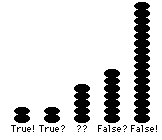
- One of its functions is this. What do you mean pump?
- Again, no clear definition.
- I don’t understand this sentence. I think the heart is both a pump (muscle) and an etheric center chest chakra – energizes and balances all other chakras.
- I don’t know in what way you mean this.
- (put quotes on “pump”) What are your concerns REALLY?
10. “Newton’s theory that white light can be divided into the colors of the rainbow is wrong. Color is the deeds and sufferings of light. It results from the conflict of light and darkness.”
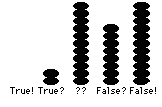
- (“wrong” underlined) Who can say one metaphor is right and another wrong?
Beliefs 9 and 10 are expressions of anthroposophical pseudoscience. The slogan “The heart is not a pump” is repeated often. The parents rejected this confidently, twenty-three to four. Newton’s error is a fundamental tenet of “Goethean Science” taught in Waldorf schools. Fewer parents were sure about this, but the rejection is seventeen to two.
11. “Rudolph Steiner, the founder of the Waldorf School, possessed occult powers.”
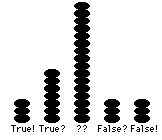
- Can’t answer – what are “occult powers?” Don’t have any information anyway.
- Don’t know a thing about him.
- Occult = hidden, no more, no less.
- You might as well ask: did Jesus?
Rudolph Steiner claimed many times to have occult powers, clairvoyance and “supersensible perception,” the ability to perceive a spirit world hidden behind ordinary perception. He rested the credibility of all his teachings on this foundation.
12. “No person has ever been able to demonstrate any supernatural power in a situation where the possibility of delusion or deception has been excluded.”

Belief 12 is a fundamental tenet of skepticism and secular humanism.
13. “The physical body of a human is organized into three systems, the nerve-sense system, the metabolic-muscular system, and the rhythmic system, which mediates between the other two.”
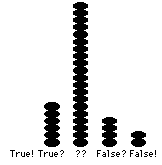
- (“rhythmic system”) I don’t know the meaning of this term, but it sounds ridiculous.
- There are many lenses with which to view. This is not necessarily true or false.
- Why is this model considered either true or false?
14. “Impulses from the central nervous system are carried to the muscles and organs by the motor nerve cells.”
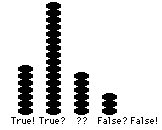
The three systems of the body in 13 describe the basic organization of physiology as taught by Steiner. The overwhelming “don’t know” response shows that these parents are not familiar with his teachings. Statement 14 is an expression of scientific physiology found in a typical sixth-grade science book. Steiner followers oppose this specific point, saying instead that the motion of the limbs is caused by the direct action of “the will” in the muscles. The parents supported science over Steiner twenty-three to three.
15. “The members of the whole man include the etheric body and the astral body.”
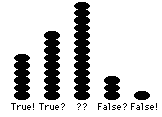
- True but I would call your “etheric” a “causal” body – but close enough for a survey!
- Among others.
- (underlined “man”) Please don’t use this word if you mean human.
From Steiner.
ANALYSIS
I thought it would be interesting to know what the relationship might be between new-age beliefs in general and belief in anthroposophical teachings. I added up a “new-age belief score” for each individual survey by combining the responses to questions 3, 4, 5 and 6. I counted “False!” as zero and “True!” as four points. Similarly I made an “anthroposophical belief score” for each person by adding up the responses to 9, 10, 11 and 15. The pairs of scores from each person’s survey are shown as a two dimensional relationship:
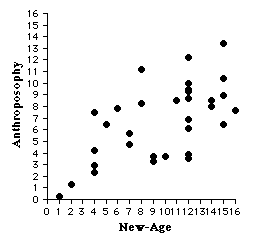
Chart 1: Anthroposophical and new-age beliefs tend to go together.
The thirty-two parents’ scores cluster loosely around a suggested diagonal line. This indicates that approval of new-age beliefs and approval of anthroposophical ideas are related in this group, that is, parents more commonly accept both than one or the other exclusively. The angle of the cluster more toward the new-age axis shows a stronger acceptance in that direction.
Another question I have relates to the efficiency of the school in converting families to the anthroposophical world-view. How do the anthroposophy scores compare to the years in the school?

Chart 2: Is belief in anthroposophy stronger in parents who have been at the school longer?
A trend is noticeable here too. Keep in mind that the present population of the school is greater in the lower grades, and that the drop-out rate is unknown. Perhaps those who stay believe in anthroposophical ideas more strongly as years go by, or those who don’t believe withdraw.
CONCLUSIONS
The school’s claim that the parents choose the Waldorf school because they agree with its philosophy is false. The evidence supports my contention that most parents know very little about anthroposophy. Furthermore, the responding parents directly opposed some tenets of anthroposophy, especially in the sciences. Most parents are not aware of the poverty of the science curriculum or of its pseudoscientific content.
Since the Waldorf School curriculum includes a significant amount of anthroposophical doctrine, this evidence raises ethical questions. What is the morality of missionary activities which are carried out through a hidden agenda? Is it honorable to teach religious beliefs to children which are not shared by their parents?
